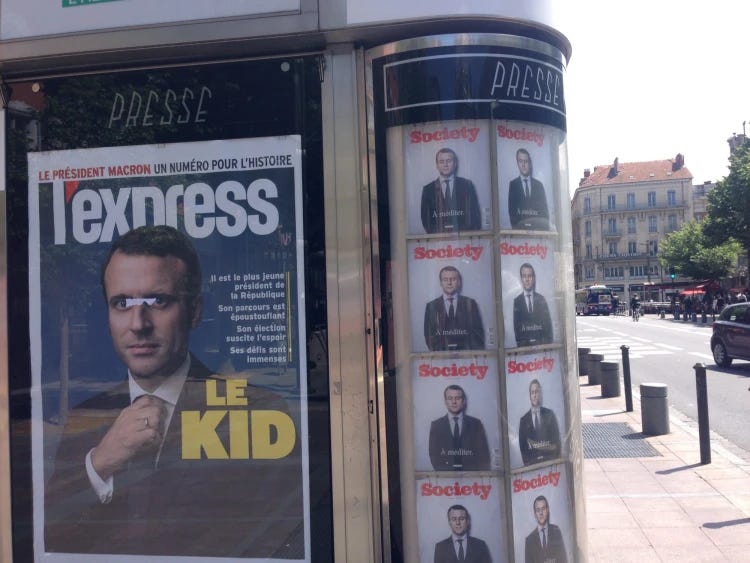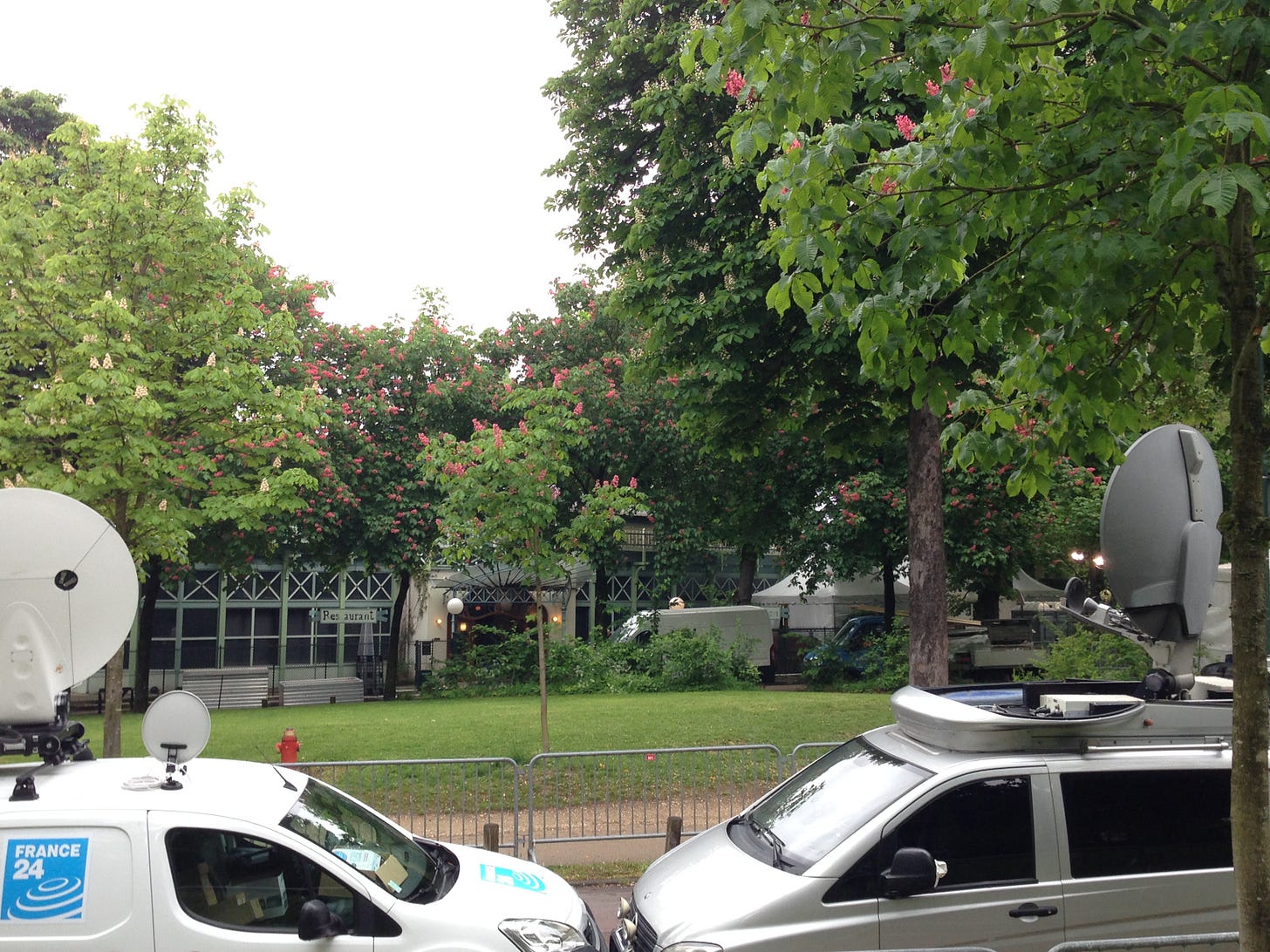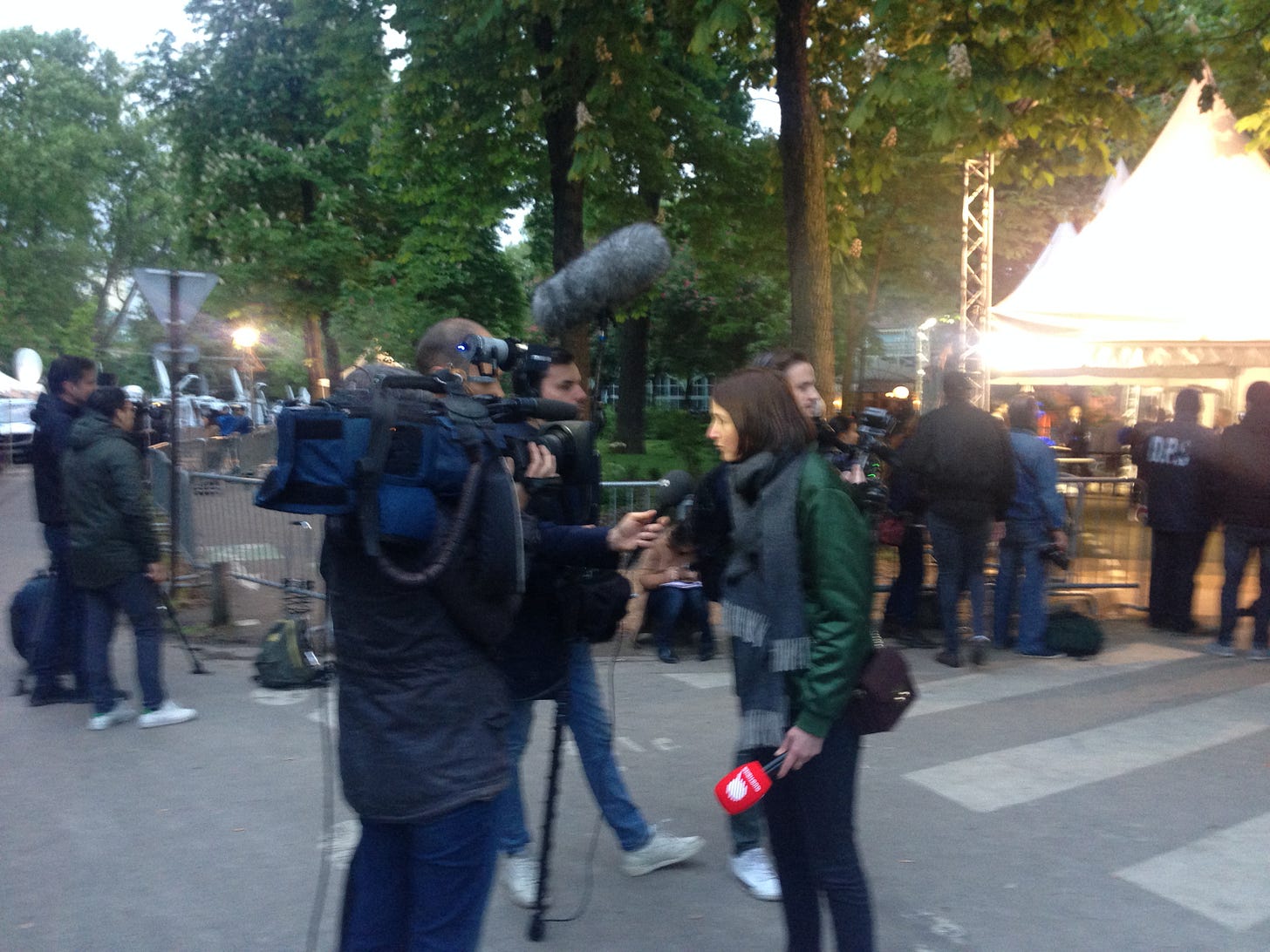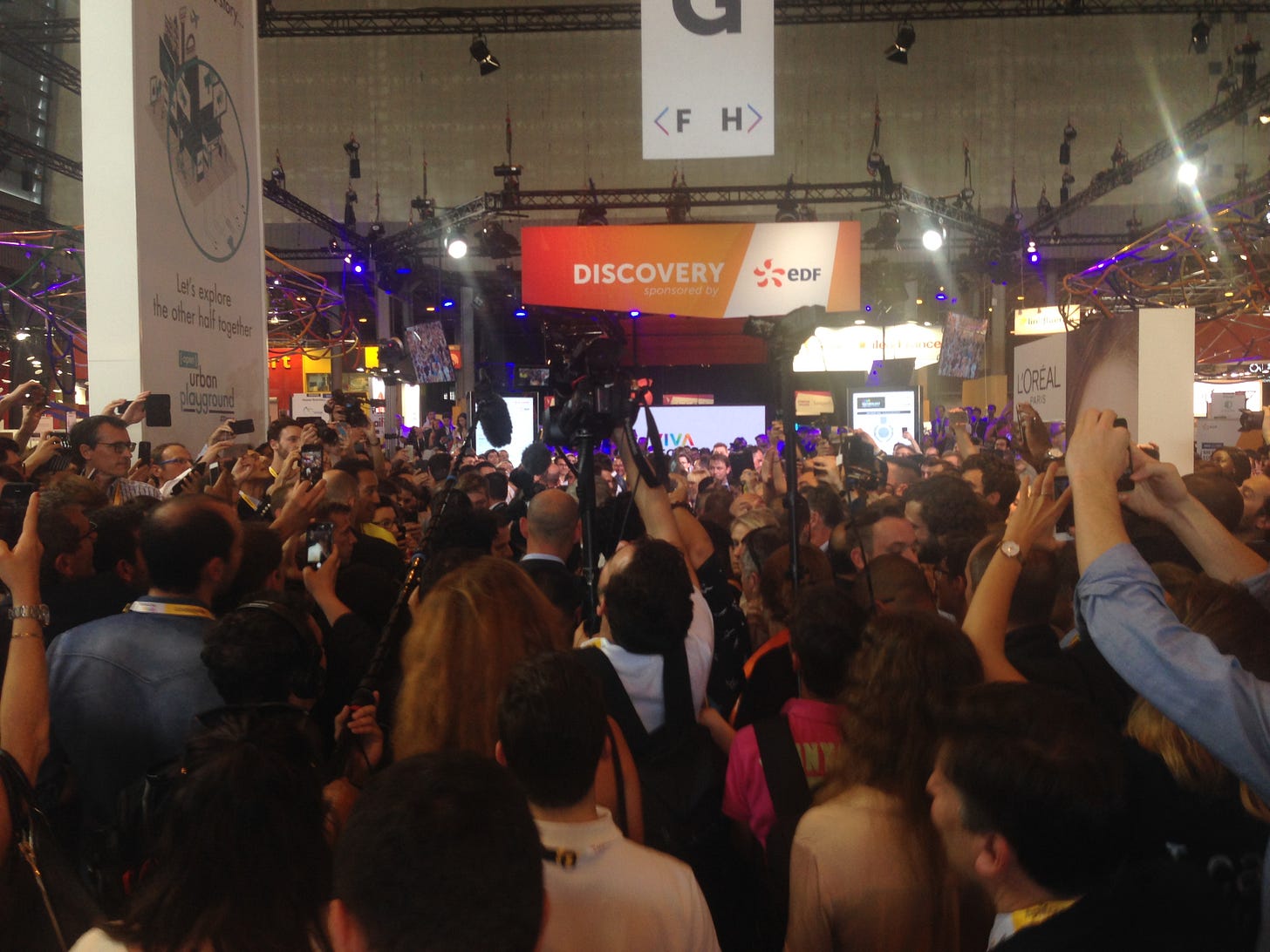The Startup President: Part VI
In which Macron wins a resounding victory that cements his rise even as a vanquished Le Pen looks toward 2022.
The following is an excerpt from a book project about life in modern France. This week, I’m publishing in 6 parts a chapter I wrote about my various encounters with Emmanuel Macron and his 2017 campaign for president. Most of this is based on stories for VentureBeat and the Los Angeles Times. Some of the writing has been recycled elsewhere, so you may recognize snippets. But with the first round of the French elections approaching this Sunday, it felt like a good time to look back at the last campaign that transformed Macron from an obscure figure to an unlikely president who continues to confound the French.
For the second round of voting on May 7, I flew to Paris for the Los Angeles Times. The idea was to scope out the mood of voters across the city. And I was tasked with the duty of attending the evening reception for Le Pen. After the joyless hour-long train ride from the airport, I arrived in the city center to begin hunting voters.
Naturally, it was raining.
Voting is held on Sundays, so the morning was quiet. The French are not early risers as a rule, and then there is church, and then the marché. On top of that, this was a holiday weekend because the following Monday, May 8, celebrates the official announcement that the Germans had been defeated in World War II. On top of unthinkable amounts of vacation, France recognizes 11 national holidays. There are three in May alone making it rare that there is a week when kids are in school all five days, leaving parents like us to silently curse the month. As such, the Paris streets were fairly subdued under grey skies and gave little hint of the drama unfolding across the country that was being so closely watched around the world.
A voting station near the Paris City Hall was largely deserted through the morning and lunch hour. Julien Landel, the first assistant mayor of the 4th Arrondissement, and the director of this voting station told me requests for "procuration," which lets someone else cast a ballot in their name, were up 40 percent this time compared to the first round two weeks ago. No need to choose between national duty and vacation! He expected turnout to be a bit down from the first round when voters chose between 11 candidates. "People were more mobilized to come out and support their candidate," he said. "Now more people are feeling disappointed and that there is not a choice for them."
Standing outside the voting bureau, Joël, who declined to give her last name, was a cultural event planner who backed Fillon in the first round. She voted for Macron today. But for her, it was more motivated by a fear of Le Pen than a sign of support for Macron. "It's an obligatory choice," she said. "Abstaining was not a choice because we risk letting Le Pen get into power. And that would be a disaster for France, for Europe, for the whole world."
Still, she said she was already looking forward to the legislative elections next month, where she hoped the Republican Party could be more successful, and at least create a situation where Macron's power is limited by a divided government. While Americans are accustomed to such divided governments, in France this is referred to “co-habitation” and rarely happens. Joël said she’d be watching to see how Macron reacts should he win. But she echoed many of his critics who felt he had a tendency to come off as arrogant and elitist. "Well, he chose the Louvre (Museum) for his assembly tonight," Joël said. "He could have gathered people at the Bastille, a real symbol of a revolution. The Louvre, that's a symbol of royalty. What does that say about him?"
By contrast, Anais Hegron, who worked in the fashion industry, was feeling a bit more optimistic after voting for Macron, whom she also backed in the first round. Hegron, a supporter of the Socialist Party, said her first vote for Macron was a strategic one as it became clear the Socialist Party candidate Hamon had no chance to survive the first round. She was waiting to see if Macron wins, and if so, if the Socialist Party could regroup and mount a credible challenge in the legislative elections. For now, she felt the most critical issue was blocking Le Pen's path to power. "Never Le Pen," she said. "Never."
In the city center, Macron’s camp was indeed planning a massive celebration at the Louvre, which another Times colleague had been tasked to cover. Eventually, I made my way to the southeast Parisian neighborhood of Saint-Mandé, which is adjacent to the Bois de Vincennes, a sumptuous 2,500-acre park that is the city’s largest. The park is home to Chalet du Lac restaurant, the former hunting lodge of Emperor Napoleon III. That’s where preparations were underway throughout the day by Le Pen's camp for an election evening reception of 500 people. If there was possibly a moment that my rapprochement with Paris began, it was on this day strolling around Saint-Mandé. Lying just outside the périphérique, it felt like a village within the city. I remember texting my wife that this was perhaps the first place in Paris that I had visited where I could imagine living, should such a fate befall us (spoiler alert: it did eventually befall us). This despite the incessant drizzling and the hive of activity as international journalists packed the surrounding roads in anticipation of Le Pen's arrival later in the evening.
As the sun set and the light dimmed, attendees began navigating the intense security. During the campaign, Le Pen and her people had taken on a combative attitude toward the press, often ejecting or banning journalists from events. That sparring continued election night, with the Le Pen campaign choosing this small location that couldn’t accommodate most journalists who arrived and found themselves stuck outside, including me. Several campaign officials found themselves in verbal sparring matches with journalists furious about not being allowed inside. Eventually the scene outside devolved into journalists interviewing other journalists about the situation, the saddest of all media spectacles.
Finally, at 8 p.m. the results were announced. Macron won handily with 66.10 % against Le Pen’s 33.9%.
Surprisingly, the atmosphere at Le Pen’s reception was far from the feel of a funeral one might expect for a candidate that had been so badly beaten. Inside, Le Pen hugged and kissed supporters, who cheered and waved the blue flowers that symbolized the Front National. Videos of her dancing floated around social media. Outside, supporters said that while they were disappointed with the result, they said they still felt proud that Le Pen had come so far against a system they considered to be stacked against them. Several supporters said they felt the political establishment, the media, and many religious institutions were aligned against her and were responsible for distorting her positions and labeling her a “fascist” with no evidence to support the claim.
They also made clear that they felt this was the beginning of her movement, and far from the end. They pointed to the looming legislative elections the following month and said they felt optimistic about the future of the Front National Party under Le Pen. As he entered the Le Pen party, Jean-François Perier said he still supported her and felt she had run a strong campaign, despite criticism that sometimes came even from the right. “Am I disappointed? Yes,” he said. “But she is still the best voice to challenge the EU.”
Following her concession speech, supporter Jean Messiha, an economist at Paris’ Science Po university and a top campaign advisor, said Le Pen and the Front National had overcome tremendous odds. “We ran against the country’s political system,” he said. “And now the Front National is the primary opposition party in the country.”
Attendees included some faces that may have seemed surprising, including Roula Talj, 45, of Lebanon. Talj said she met Le Pen a few years ago through friends and felt they shared mutual positions regarding terrorism and the treatment of women in the Middle East. She couldn’t vote for Le Pen, but she wanted to be there to cheer her on. “We have both been on the front line in the war against terror,” she said.
Anne Lavernier D’Havernel, a short, elderly woman from Brittany, walked out of the event carrying her blue flower and a smile. Saying the FN had “lost the battle, but not the war,” she said the press and the establishment had misrepresented people like herself, who had hosted refugees at her home and believed in respecting all races and countries. By the same measure, she felt that many new immigrants were not respecting France’s culture and that the country needed someone like Le Pen to protect its culture and value. “France is the most welcoming country in the world,” she said. “But when someone comes to your house and sleeps on your couch, they have to respect the rules of your house.”
Across town, the images at Macron’s event were far more joyful. Music blasted from the stage as a relatively young crowd danced through the night. They were his unabashed fans, many of them overjoyed that Macron, their candidate, the candidate of entrepreneurs and the future, had triumphed. The candidate himself arrived as Beethoven’s Ode to Joy, the European Union anthem, blasted from the speakers. “What we have done for the last many months has no precedent or equivalent,” Macron said in a sober address to the crowd. “Everyone said it was not possible, but they didn’t know France.”
Macron’s rivals may have been beaten, but they were already gearing up for the National Assembly elections the following month. Each party believed this would be their chance to put Macron in his place and begin their comeback. Giving them some hope was the record abstention of 25.4% of all voters, a staggeringly high level for France. It seemed to leave open the possibility that Macron’s critics would dog him for the five years to come with accusations of illegitimacy. And because they were sure En Marche! was a paper tiger, a vehicle solely for Macron’s ego, he probably wouldn’t even be able to round up the hundreds of candidates he would need to gain a majority in the Assembly.
Again, it was a bad misreading of what En Marche! had become, how deep its roots had already spread across the country. In just a couple of weeks, the party, now called La Republique En Marche, had registered 511 candidates to run in 577 Assembly races. The candidates were split evenly between men and women, many coming from outside politics having never worked for the government or run for office, and about 15 years younger on average than members of the current Assembly.
Over two rounds of voting, candidates loyal to Macron won 350 seats, a historic majority of about 60% of all seats. Les Republicans managed to gain about 19% of the seats but would largely be powerless. As for France Unbowed, the Socialist Party, the Front National, they were virtually smashed out of existence at the national level.
Macron would have a free hand to propose and pass his policies thanks to a massive Assembly majority that owed its entire existence to him. No serious opposition existed. For now.
Startup Nation
Following the death of LeWeb, a panic set in among tech leaders in France. They looked around Europe where mega-tech conferences were multiplying and worried that Paris lacked a marquee event to draw big tech names and companies to the city. And so, in 2016 was born a successor of sorts, dubbed Viva Technology.
The point of Viva Tech isn’t always readily apparent, other than to have a big tech event. But from the French Tech perspective, it made perfect sense. At the heart are those giant corporations that the government had been nudging to get with the whole innovation thing. Viva Tech put them front and center in giant booths. For a Silicon Valley visitor, a tech conference that featured the post office or Accor Hotels at a booth filled with dozens of startups they were fostering would seem odd. For France, it was a way to pat them on the back.
Despite these motivations, Viva Tech became quite large in short order, attracting 10s of thousands of attendees. The second edition was held in mid-June 2017, in between the first and second round of voting for the National Assembly, when it was already clear that En Marche! was headed toward a landslide victory. If the presidential vote and the abstention rate left some wiggle room to debate Macron’s mandate, the wave that swept across the Assembly vote appeared to be an inarguable sign of support for his agenda.
Macron arrived at the tech salon and was greeted like the conquering hero you’d expect. He toured the exhibit floor, surrounded by a selfie-taking mob as he checked out robots and virtual reality demonstrations. These were the people Macron had been addressing since he first became Economy Minister less than three years earlier. As he moved, a tiny speck in a sea of humanity, the crowd followed, knocking over booths and displays in the hopes of catching the slightest glimpse of their man. “The tide has been turning in our favor for about a year now,” Nicolas Dufourcq, CEO of the country’s state investment bank Bpifrance, told Reuters that day. “It is as if the French Tech’s boss had been elected as the new president.”
Eventually, Macron moved to the stage to deliver a keynote address. Sitting in the auditorium that day, I flashed back to that appearance at Le Web just 2.5 years earlier. The improbability of what Macron had accomplished was stunning, no matter whether one supported his platform or not. Macron had done more than just talk about startups. He created what was arguably the country’s most successful startup in En Marche!. Using digital tools and entrepreneurial cunning, he built a new centrist political party from nothing — one that carried him to the presidency and then to a massive legislative majority.
“I want France to be a startup nation,” Macron said from the Viva Tech stage. “Everywhere, women and men want to innovate. France is in the middle of becoming a nation of startups…We will drive through these transformations without delay. You do not wait, because your competitors do not wait…We need a nation that thinks and moves like a startup.”
A month later, the Macron victory tour continued at the grand opening of Station F. Standing on a stage surrounded by an adoring throng of youthful entrepreneurs, Macron proclaimed a new era for France. "What brings you here is an immeasurable ambition,” he said, wearing his dark suit with the red French Tech rooster pin. “Not necessarily to earn money, but also not be ashamed to do so, which I have said before and often been criticized for saying. If you are here, it is because you decided to write a new page for the planet.”
For a nation accustomed to being the subject of French bashing by the international press, suddenly it seemed the country’s reputation had undergone its own revolution. The world was rediscovering France. Glowing stories appeared, hailing France for picking a president who embraced globalization and the E.U. Newspapers and magazines were suddenly amazed to find that France was full of eager startups and entrepreneurs, as if they had suddenly sprouted up like a field of mushrooms in the fertile soil created by Marcon’s election. His vocal support for the fight against climate change had liberals around the world swooning.
A few days later, I was back in Toulouse and sitting along the banks of the Garonne enjoying an evening picnic of beers, wine, and cheese with friends under blue skies and welcoming sun. Surely, I wondered aloud, it must be nice to feel that praise flowing from this global embrace of France, this worldwide admiration, and this rising international status of Macron?
“Well,” one woman responded with a shrug. “The bosses are happy anyways.”





